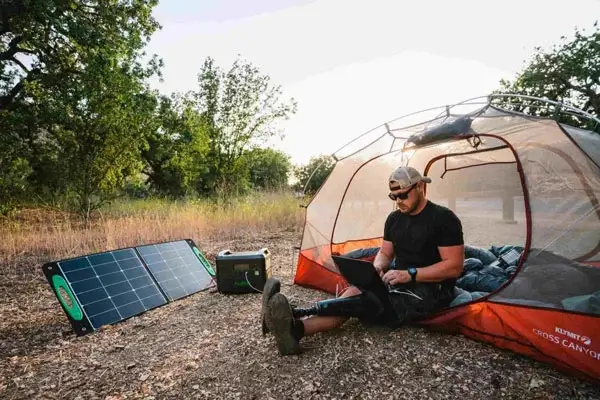Solar generators give a sense of freedom for campers who prefer boondocking or RV camping, knowing that your power source is unlimited. After getting your Acevolt solar generator, you need solar panels to receive energy from the sun and power your RV camping gadgets all through your trip.
Solar panels promote environmental friendliness where you never have to bother about generator noises while enjoying the outdoors. These panels come in various sizes and types, but it needs access to enough sunshine to work effectively. Once you have decided on an excellent solar panel choice, you need to understand how to use it.
Solar panels can power RVs the way it works in residential homes. Based on your RV’s specifications, solar panels for campers have different designs. They are portable, convenient, and add a little weight to your RV roof. Compared to the solar system panels used in homes, the ones for RVs are smaller.
Solar panels for RVs are used to power kitchen appliances and small gadgets such as phones, while it primarily covers all electrical needs in homes. You can add any devices if you have enough space in your RV and know the energy storage capacity. Aside from offering the best portable power station on the market, AceVolt produces portable solar panels to supply sustainable electricity to your campsite.
Some components in solar kits are a charge controller, solar panels, inverter, and battery bank. If you’re looking for sustainable means of supplying electricity to your campsite, RV solar panels are just for you. The solar generator system is a good investment.
To determine the number of solar panels you need for your RV, you need to know the energy used per hour by your RV and the energy stored in your batteries. It would help if you balanced both for optimal functionality. Having a solar-powered RV without batteries to hold the power they produce will waste and not provide the necessary energy needed. You need to figure out how this works.
Having more than one solar panel will help you fully charge your batteries faster, especially for campers who use more electronic devices. A 100-watt solar panel produces a maximum of about 30 amp-hours per day. By understanding this, you can estimate the battery capacity vs. solar panels.
To figure out the number of solar panels your camping solar generator would need, you should know the following;
You need to know the energy measured in watts per hour used by your RV each day. One of the ways to know this is by calculation. First, you multiply the number of watts used by an appliance by the number of hours. Take, for example, if any of your gadgets use 100 Watts per hour and for 2 hours per day. To calculate the energy used per day, multiply 100 watts by 2 hours; this would be 200 Watt/Hours per day. When you add all the energy used each day using this calculation, you will estimate the number of solar panels you would need.
Knowing the energy provided by your solar panels and stored in your batteries is essential. You can assume that a 150-watt solar panel will generate 960 watts per day, but this is dependent on the location you find yourself. Knowing the number of batteries, you will need to store power is essential. Under perfect conditions, your solar panel would give you the number of watts. The energy stored may not be that easy to estimate because of the weather changes. One day can be sunny while the next may be rainy. Instead of calculating your storage capacity, you can observe your battery usage in a day. You can use a battery reading device to know the power your RV needs.

You can consider getting a generator to ensure a stable power supply since the solar panels rely on producing energy from the sun, and the weather may not be favorable at times. When on camping trips, generators can be a backup power source and eliminate your worries about energy conversion.
Some RV generators have reduced noise levels and are easy to install. Fuel types sometimes classify RV generators, including gasoline, propane (LP), diesel, and dual-use. The engine in RVs can use any of these fuels. Both solar panels and generators have pros and cons.
Generators can power your RV just like your solar panels, but it’s are not environmentally friendly, and you must rely on fuel. Although solar panels can be pretty expensive, it saves you money in the long run. If you are a regular camper, you need to decide which power source suits you best. You can always use the solar panel during the day and then switch to generators as backups. The best solar generator for off-grid living is the one that has an output wattage equivalent to your off-grid power needs. It should have a high battery capacity, a high number of life cycles, a fast-charging speed, and multiple output ports, among other qualities.
As a camper, if you intend to use your RV for an extended period, solar panels will save you a lot of costs. Your solar-based generators rely on solar panels to receive the energy from the sun that you use in powering your RV and other camping gadgets.
Before embarking on your trip, it is advisable to learn how to take care of your portable power station and solar panel. Also, you should master how to set up your solar-powered generator and wire your solar panel to your RV for installation. It may result in shocks or fire outbreaks when not correctly installed. When you go camping in the wild or prefer not to use an RV electrical hookup from campsites, a solar system is suitable for your off-grid living.
